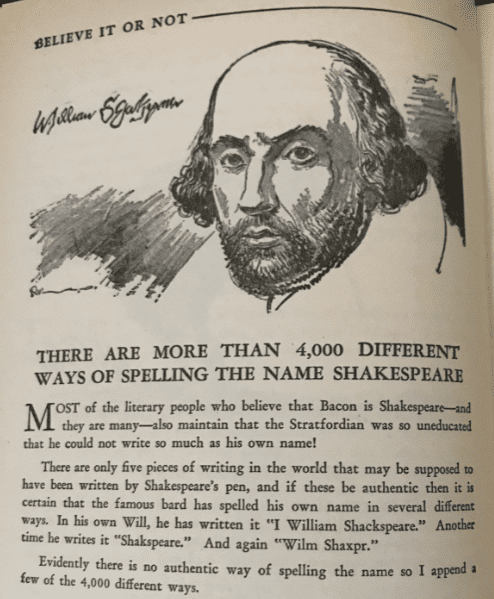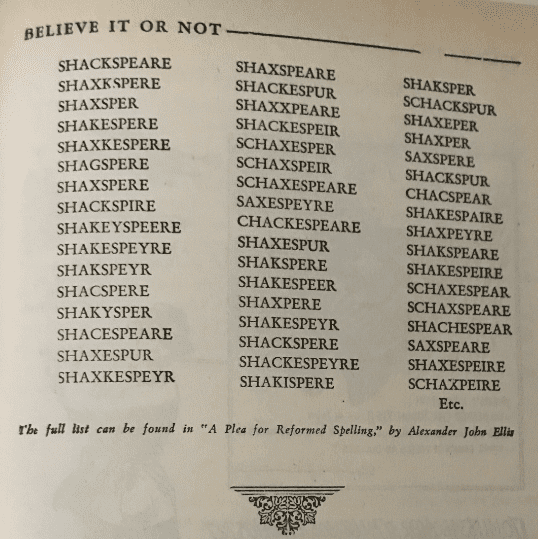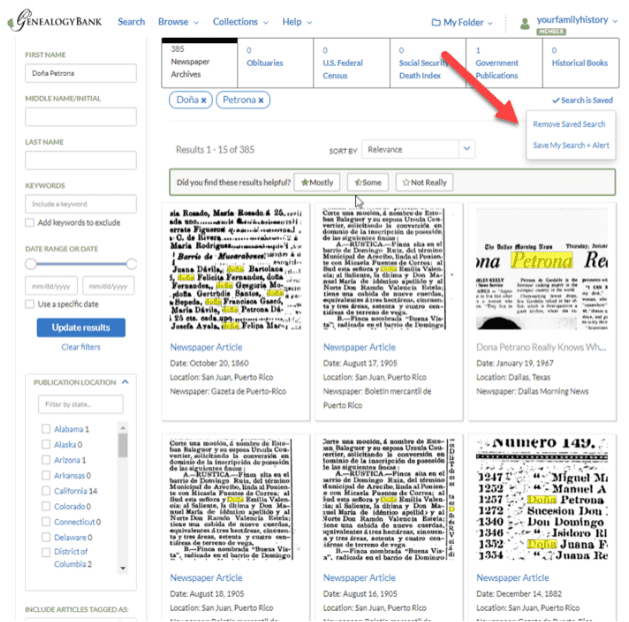Introduction: In this article, Gena Philibert-Ortega gives tips for using name variations and nicknames for better results searching your ancestor’s name. Gena is a genealogist and author of the book “From the Family Kitchen.”
Recently, I was thumbing through a 1946 edition of Ripley’s Believe It or Not and I came across this Shakespeare fact. (1)

4,000 spellings! That’s a lot of name variations. Think about how boring you must be to only spell your name one way!

But in all seriousness, we need to keep the Bard and his 4,000 name variations in mind as we research. Even though we may think our ancestor spelled their name just one way, that doesn’t mean everyone who came in contact with them (clerks, government officials, friends, journalists) spelled it the same way. This is especially important as we search GenealogyBank’s Historical Newspaper Archives for our ancestor.
There’s More than One Way to Spell John
Any given name is going to have spelling variations, misspellings, and nicknames. For example, consider the name John. It might be:
- John
- Jon
- Johnny
- Jack
- Jno
As I was typing this list my son came into my office, saw this article, and told me that I spelled John wrong. To him Jno is wrong. But to our ancestors in the 19th century, Jno was just another way to abbreviate John. We need to consider that names change over time and may have once been abbreviated differently. Nicknames are another variation of a name that might differ from one generation to the next. And for those who may think that John can’t be misspelled too many ways, one website I checked showed 201 ways John could be misspelled. (2)
One way you could search for your ancestor in GenealogyBank’s Historical Newspaper Archives is to enter two names. In the search engine’s first name field, enter two names separated by the word “or.” For example, search for “John or Jno.” This way you will receive results that use either name.
Studying Shakespeare or Shaxspear
Looking at the partial list of Shakespeare name variations, you may notice that the variations include instances of silent letters, letters that have similar sounds (such as k and x), and the addition and deletion of vowels.
We need to consider these variations when we search for our ancestor’s name. For example, my last name Philibert is spelled with no “a.” However, my family pronounces our surname, Fill-Ah-Bert. Now those who have any knowledge of the French language know that the way I pronounce my last name is not the way it should be pronounced (I’m sure my French-Canadian ancestors would be rolling their eyes). However, over time that’s how our name has evolved.
Now if someone was documenting my great-great grandparents, who no doubt pronounced their surname correctly, our surname would have sounded – and been “misspelled” – differently than it would be today. That means for my research, I need to take time and place into consideration as I document name variations that might differ according to the original French pronunciation verses the way we pronounce it today.
Lastly, a name’s creative spelling could be different once the typewriter is introduced. A slip of the finger and one neighboring letter could be substituted for another accidentally. This is important to consider when we look through indexes or transcriptions.
Make a List and Check It More than Twice
It’s important to keep a list of spelling variations as you come across them, as well as those that you anticipate finding. Start your list by including all the known misspellings, as well as nicknames that you can think of, for your ancestor’s name. Keep the list handy so that you can add to it as you encounter new misspellings. Enlist younger family members in coming up with variations. Younger children will spell the name phonetically as they sound it out. You need that kind of “creativity” in order to imagine how others who encountered your ancestor may have spelled their surname.
Make sure to search GenealogyBank’s Historical Newspaper Archives using each variation you come up with. Remember, unless the surname is a common one, you might have better luck searching on just a surname – and then if the results are too numerous, narrowing your search by a time period or a state. Once you conduct a search, even if you find no results, not all is lost. Click on Save/Alert and then in the dropdown menu choose Save My Search + Alert to receive an email every time a newspaper article matching that term is found.

A Search Takes Time
Searching takes time, and that includes time to craft multiple searches which take into consideration factors like name variations. Searching on name variations can mean the difference in finding or not finding your ancestor in the newspaper.
Explore over 330 years of newspapers and historical records in GenealogyBank. Discover your family story! Start a 7-Day Free Trial
________________
(1) Ripley’s Incredible Believe It or Not. Garden City, New York: Garden City Books, 1946.
(2) “How Do You Spell John?” SpellChecker.net (https://www.spellchecker.net/john: accessed 15 May 2020).

I need suggestions for variations of my maiden name of Semales. Seems my grandmother spelled it this way because my grandfather did not know how to spell or read, I was told. He was born to Russian parents, but moved on to Lithuania during the Russian Revolution. Please help…
Donna, it might be worthwhile to talk to a genealogist specializing in Russian or Eastern European research for some ideas. You can find one by searching the directory at The Association of Professional Genealogists website
Depending on how it’s pronounced, I would assume you could substitute the “s” for a “z.” But I imagine there are many more options including substitutions for the vowels.
Good luck!–Gena
Thanks for the tip I will try as you said.. Again thanks
I think that at some times/places, Jonathan was considered to be a different name than John, not just an abbreviation for it.